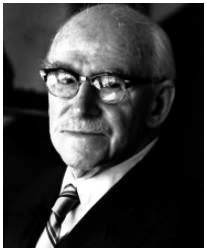A Pocket Biography of Brand Blanshard
Brand Blanshard was an American philosopher, and the foremost proponent of rationalism in the 20th century. He was among the most important philosophers of that century, and by some criteria may have been the most important of all.
Chief Contributions
Blanshard consistently addressed some of the most important of philosophical topics. The Nature of Thought exhaustively traces the role of purposiveness in human cognition. Reason and Analysis is an essay in metaphilosophy, or the philosophy of philosophy, and more clearly and accurately characterizes the nature and aims of philosophy itself than perhaps anyone else ever has. In theory of knowledge, his account of the coherence theory of truth remains the highwater mark for that position. His call for a religion within the bounds of reason alone far surpasses the equivalent statement offered by Kant. In ethics, his Reason and Goodness makes the case against moral relativism and for an ethic centered in self-actualization; and Four Reasonable Men provides a theory of ideal human personality oriented by reason.
Intellectual Affiliation
While he was sometimes erroneously classified as an "absolute idealist", he rejected this characterization, and instead considered himself a rationalist. Rationalist philosophers believe in the importance of evidence and logical consistency in arriving at beliefs of any kind.
Biography
Blanshard was born in Fredericksburg, Ohio, on August 27, 1892. Initially educated in a two-story, wooden schoolhouse in Edinburg, his family subsequently moved to Bay View, Michigan. On graduation from the University of Michigan, he attended Oxford on a Rhodes scholarship.
While there came to know poet T. S. Eliot and the philosopher Bradley.
Went next to Columbia, where he studied with John Dewey, and married a fellow student, Frances Bradshaw.
On graduating from Oxford, he was admitted to Harvard, and on graduation taught at his old alma mater, the University of Michigan.
From 1925 Blanshard taught at Swarthmore for 20 years.
He became president of the Eastern Division of the American Philosophical Association in 1941, and in 1943 was appointed to the Board of Officers of that association.
In 1944 Blanshard was invited to take a position at Yale, where he taught theory of knowledge, metaphysics, and ethics.
While still at Yale, Blanshard lectured at over 140 universities by invitation, and was awarded 13 honorary doctorates.
He retired in 1961. His wife died in 1966, and he remarried in 1969.
Chief Publications
He was invited to deliver the Gifford lectures in Scotland in 1952, and he spent ten months there doing so. He devoted the first ten lectures to "Reason and its Critics" and the second series to "Reason and Goodness." A subsequent invitation to deliver the Carus lectures afforded him the opportunity to develop the core of a trilogy of books, which he describes as "supplements" to The Nature of Thought. These are: Reason and Analysis, Reason and Goodness, and Reason and Belief. He describes these in this way: "Reason and Analysis defends my conception of reason in the light of contemporary analytic theories; Reason and Goodness applies the conception to ethics and politics; Reason and Belief applies it to the chief forms of Christian theology."
Additional resources
An in-depth biography may be found here.
An online resource with numerous original Blanshard essays may be found here.
A gallery of photos of Blanshard is provided at this link.


